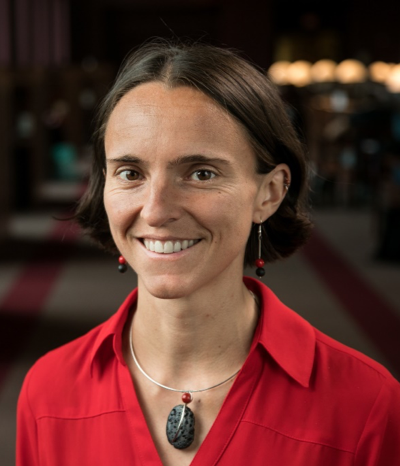Modeling Infectious Disease Dynamics: Lessons from a Pandemic

Dr. Lauren Childs
September 4 at 12:20pm via Zoom
Dr. Lauren M. Childs is an Assistant Professor in the Department of Mathematics at Virginia Tech. She received her B.S. in Mathematics and Chemistry from Duke University followed by her Ph.D. in Applied Mathematics from Cornell University. Dr. Childs was a Postdoctoral Fellow at Georgia Tech joint between the School of Biology and the School of Mathematics. Following her work at Georgia Tech, she was a MIDAS Postdoctoral Fellow and Research Scientist in the Center for Communicable Disease Dynamics at the Harvard T.H. Chan School of Public Health. In 2016, she joined the faculty at Virginia Tech. Her research program involves the development, analysis and simulation of mathematical and computational models to examine biologically-motivated questions. Her work includes modeling with diverse techniques for a wide variety of applications in epidemiology, immunology, and ecology. A main focus is understanding the pathogenesis and spread of infectious diseases, particularly those transmitted by mosquitoes, such as malaria, Zika, and dengue. In particular, she considers the interactions within a host organism, such as between an invading pathogen and the immune response, and how these within host interactions impact transmission of disease throughout a population.
Models of infectious disease have been used for over a century to inform public health policies, but never before have such models been as prevalent in the news or as debated over the dinner table as during the past six months. Even with the ubiquity of models describing the spread of COVID-19, the ability to accurately predict the appearance of cases, hospitalizations, and deaths is poor. Despite this, modeling remains an important, and for emerging disease, essential tool to understand and control outbreaks. This talk discusses challenges in modeling infectious disease dynamics with emphasis on two scenarios: the current COVID-19 pandemic and the long history of malaria around the globe. Of particular importance is how both of these diseases show a disconnect between appearance of symptoms and the ability to transmit the disease, complicating the dynamics and hindering identification and control of cases.
This seminar has no suggested readings.

This seminar will NOT be recorded.


